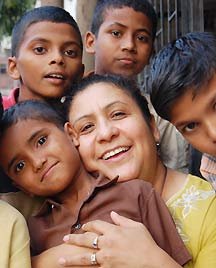NORTH INDIA—When Macarena Aldape cleans a wound or treats a rash, her Banjara patients often ask her why she is helping them.
The Banjara people’s socio-economic status often limits their access to healthcare, education and jobs with decent wages.
|
Banjara children often have limited access to medical care and health education. (PHOTO/Hali Thomas)
|
“The same God who created you created me and loves us,” Macarena Aldape, a registered nurse, tells her patients. “As a nurse, Christian, woman and mother, I try to show them love and acceptances. It is what God has told us to do—to love our neighbors as ourselves. That’s what I try to do.”
Macarena Aldape and her husband, Eddie, who serve as Cooperative Baptist Fellowship field personnel in India, hold medical camps twice a month in cities across northern India. Often, they conduct a camp for six to seven hours in one location and then conduct another one in the afternoon at another location.
The extreme poverty in which many of the Banjara people live prevents them from seeking the care of a physician. The Aldapes, natives of San Antonio, provide a variety of medical services—from treating diseases and common illness to providing education about good health practices.
“When a person learns something, that knowledge is power,” Macarena Aldape said. “It makes them feel so good about themselves. It makes a world of difference to them.”

Macarena Aldape and her husband, Eddie, hold medical camps twice a month in cities and villages throughout northern India. (PHOTO/Hali Thomas)
|
The Aldapes are also work to educate people about HIV/AIDS. With limited health education and medical care, many do not know that they are infected. Eddie Aldape said in one Banjara community, about half the adults are HIV-positive.
In 2006, the Aldapes started a boys’ home to serve families living in extreme poverty that could no longer care for their children. About 100 boys wanted to live in the home, but only 50 could be accepted. Many of these children come from homes where at least one parent is infected with HIV/AIDS. The Aldapes predict that the need for children’s home will increase in the next few years and more children are orphaned by AIDS.
Sign up for our weekly edition and get all our headlines in your inbox on Thursdays
Rajesh, the oldest of the three children, was 5 years old when he came to live at the boys’ home. His parents, who were both HIV-positive, did not want to separate their children, but also recognized that they could no longer provide them with adequate care.
“When Rajesh’s father’s health went from bad to worse, he called us over to make a promise to him that we would take good care of Rajesh,” Eddie Aldape said. “He also asked us to take the other two boys once his wife was not able to care for them. He apologized over and over and he had never before seen the love of God. He and his wife accepted Christ as their personal savior and became active members of the local church. He has since gone on to be with the Lord.”
The Aldapes conduct medical clinics at the boys’ home and other children homes. They dream of outfitting a school bus or van with medical equipment and supplies. Such a mobile clinic would give them more flexibility and “go wherever the needs are.”
“Fellowship Baptists have a vision to reach out to marginalized people –those that have been ignored and neglected,” said Macarena Aldape. “For me, it is an answered prayer to have people that care that much for others and send people all over the world to work. Through CBF we are doing the work of many others in India. It is a privilege to know that there are people out there that still care for those nobody else does.”















We seek to connect God’s story and God’s people around the world. To learn more about God’s story, click here.
Send comments and feedback to Eric Black, our editor. For comments to be published, please specify “letter to the editor.” Maximum length for publication is 300 words.